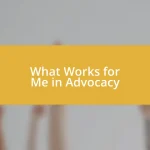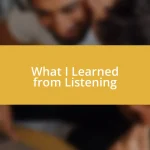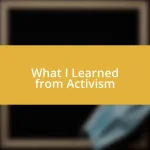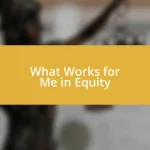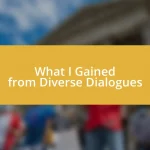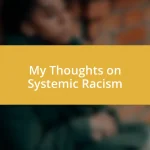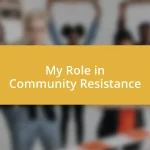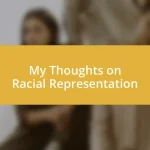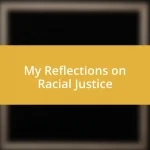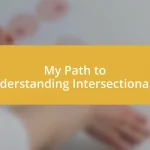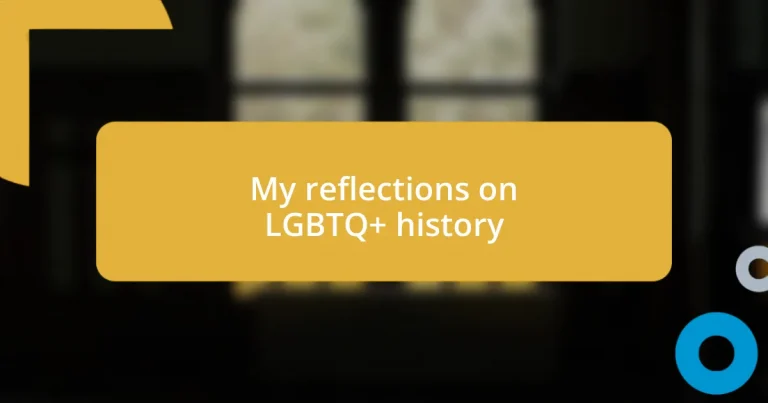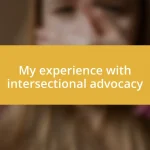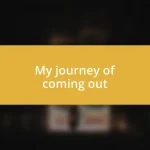Key takeaways:
- The Stonewall Riots in 1969 served as a catalyst for the modern LGBTQ+ rights movement, igniting ongoing struggles for acceptance and equality.
- Key historical milestones include the decriminalization of same-sex relationships (2003) and the legalization of same-sex marriage nationwide (2015), marking significant shifts toward social acceptance.
- Prominent figures like Marsha P. Johnson, Harvey Milk, and Audre Lorde have greatly influenced LGBTQ+ advocacy by highlighting intersectionality and the importance of representation.
- LGBTQ+ activism fosters community and resilience, emphasizing the significance of love and acceptance in creating societal change.
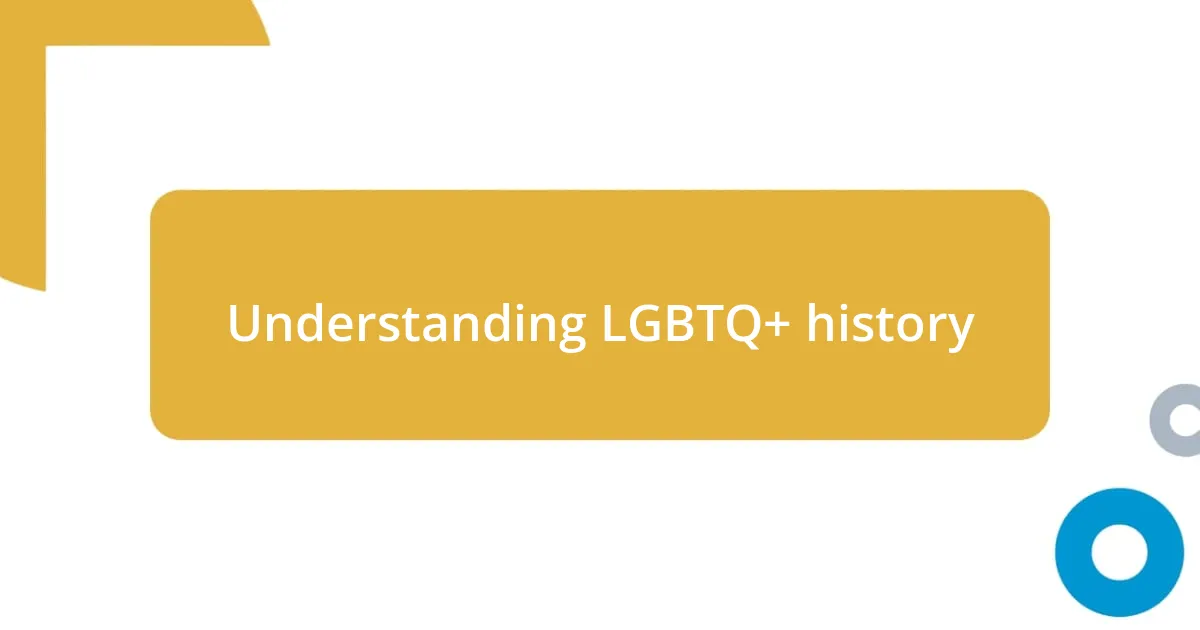
Understanding LGBTQ+ history
Understanding LGBTQ+ history goes beyond mere dates and events; it’s about human experience, resilience, and the struggle for identity. I remember the first time I learned about Stonewall—a moment in 1969 that wasn’t just a riot but a pivotal point in the fight for rights. It made me ponder: What if those brave souls hadn’t stood up that night? Their courage sparked a movement that resonates even today.
As I delved deeper, I was struck by how history often neglects the stories of diverse voices within the LGBTQ+ community. The contributions of people of color, transgender individuals, and others frequently go unrecognized. This sometimes makes me feel a sense of urgency to uplift these stories—after all, shouldn’t we celebrate the full spectrum of experiences that shaped our current landscape?
Moreover, understanding LGBTQ+ history invites reflection on the societal changes we’ve witnessed. I think about how love and acceptance have evolved in public spaces, from covert gatherings to pride parades filled with colors and joy. It’s hard not to ask ourselves: How have these moments of history shaped our present lives? Each milestone, whether celebrated or mourned, serves as a reminder of the ongoing journey toward equity and dignity for all.
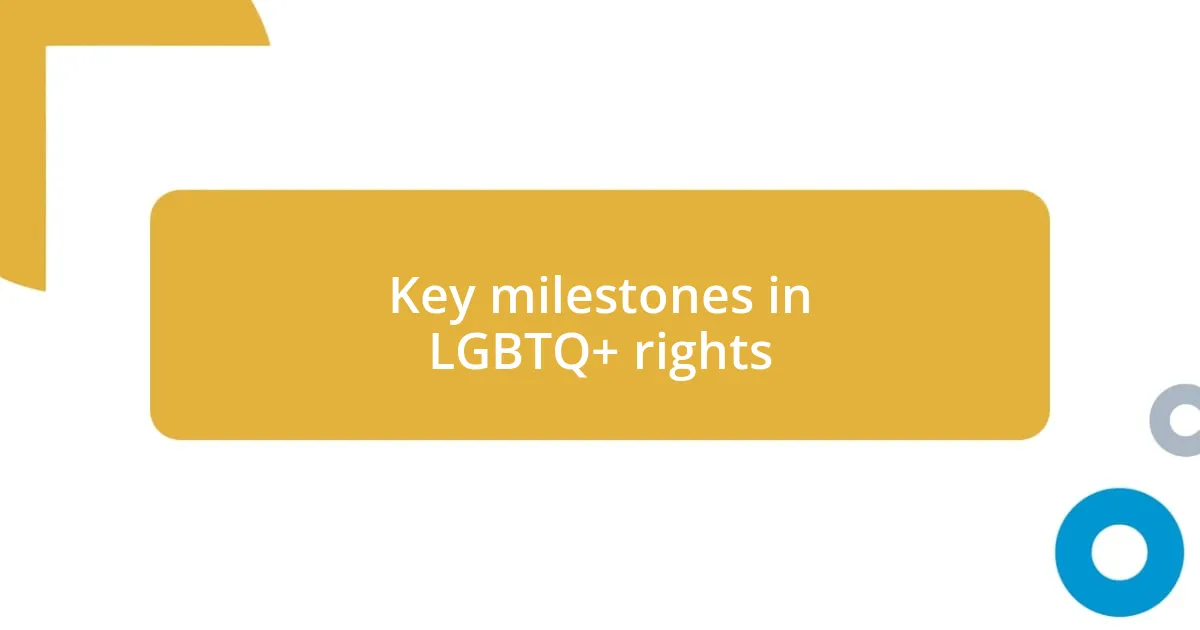
Key milestones in LGBTQ+ rights
Key milestones in LGBTQ+ rights are crucial turning points that shaped the landscape of acceptance and equality. For me, reflecting on events like the decriminalization of same-sex relationships in several countries, such as the 2003 U.S. Supreme Court decision in Lawrence v. Texas, highlights a significant shift in societal attitudes. I can’t help but think about the countless lives impacted by such rulings—each person fighting for their right to love openly and authentically.
Here are some key milestones that I believe stand out:
- 1969: The Stonewall Riots in New York City act as a catalyst for the modern LGBTQ+ rights movement.
- 1973: The American Psychiatric Association removes homosexuality from its list of mental disorders, marking a significant step toward normalization.
- 1996: The U.S. Supreme Court rules in Romer v. Evans, affirming that anti-gay discrimination violates the Constitution.
- 2015: The Supreme Court’s decision in Obergefell v. Hodges legalizes same-sex marriage nationwide, a moment I remember celebrating with friends as if we were all part of something monumental.
- 2016: The designation of the Pulse nightclub in Orlando as a National Historic Site serves as a reminder of the ongoing fight against violence targeting the LGBTQ+ community.
These milestones resonate with me not only as historical facts but as heartfelt moments that have helped transform our understanding of love, identity, and acceptance over the years.
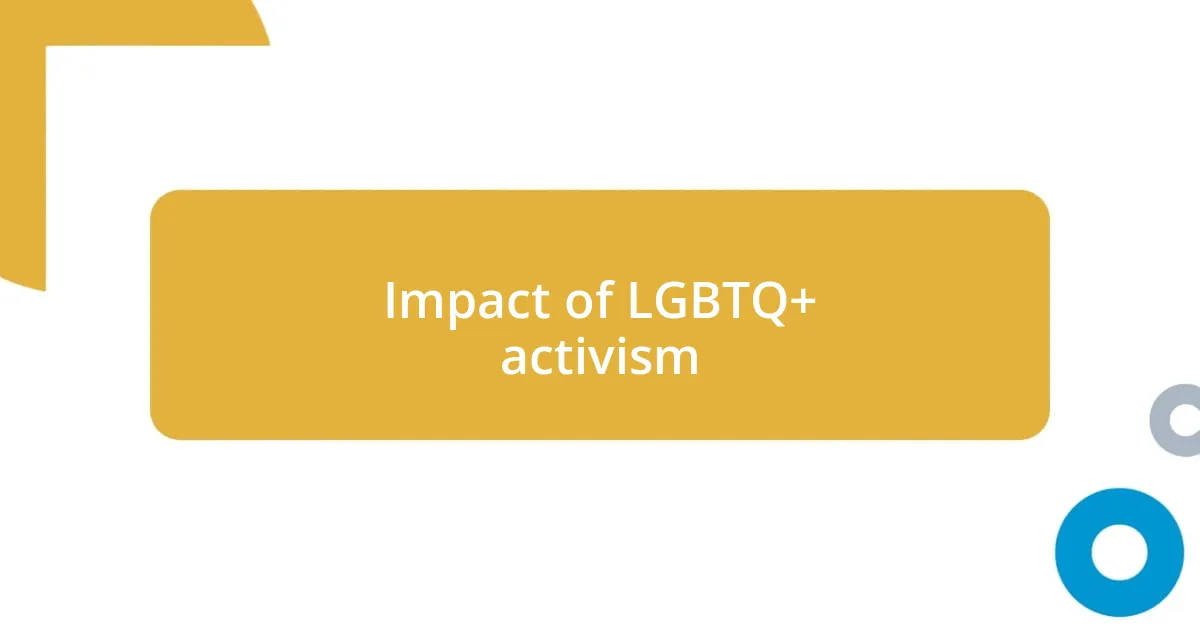
Impact of LGBTQ+ activism
The impact of LGBTQ+ activism cannot be overstated; it has reshaped societal norms and expanded the definition of family and community. When I attended my first Pride event, the overwhelming sense of belonging was palpable. It dawned on me how activism not only fights for rights but also creates spaces where love can flourish openly. That joy and acceptance I witnessed reinforced the idea that activism goes beyond policy changes; it uplifts spirits and fosters a collective identity.
LGBTQ+ activism has also played a vital role in political movements around the globe. I remember watching the debates on marriage equality unfold in my home country, feeling a mix of anxiety and hope. The courage of activists advocating for equal rights brought me to tears as they shared their love stories. Their voices rang clear, reminding lawmakers that love knows no bounds. Activism has thus not only catalyzed legal advancements but has also redefined narratives around love, advocacy, and community engagement.
The ripple effects of LGBTQ+ activism can be seen in areas such as mental health awareness and the celebration of diverse identities. I’ll never forget the moment I came across a support group for LGBTQ+ youth; it struck me how essential such resources are for fostering resilience and empowerment. By advocating for inclusivity, activists have paved the way for more comprehensive education and thoughtful discussions around mental health within the community. It makes me hopeful to see how our shared histories continue to empower and uplift future generations.
| Key Effect | Description |
|---|---|
| Social Acceptance | Activism encourages love and acceptance, transforming societal perceptions of LGBTQ+ individuals. |
| Political Impact | Grassroots movements influence legislation, making legal strides toward equality. |
| Mental Health Advocacy | Raising awareness about mental health issues supports the overall well-being of LGBTQ+ individuals. |
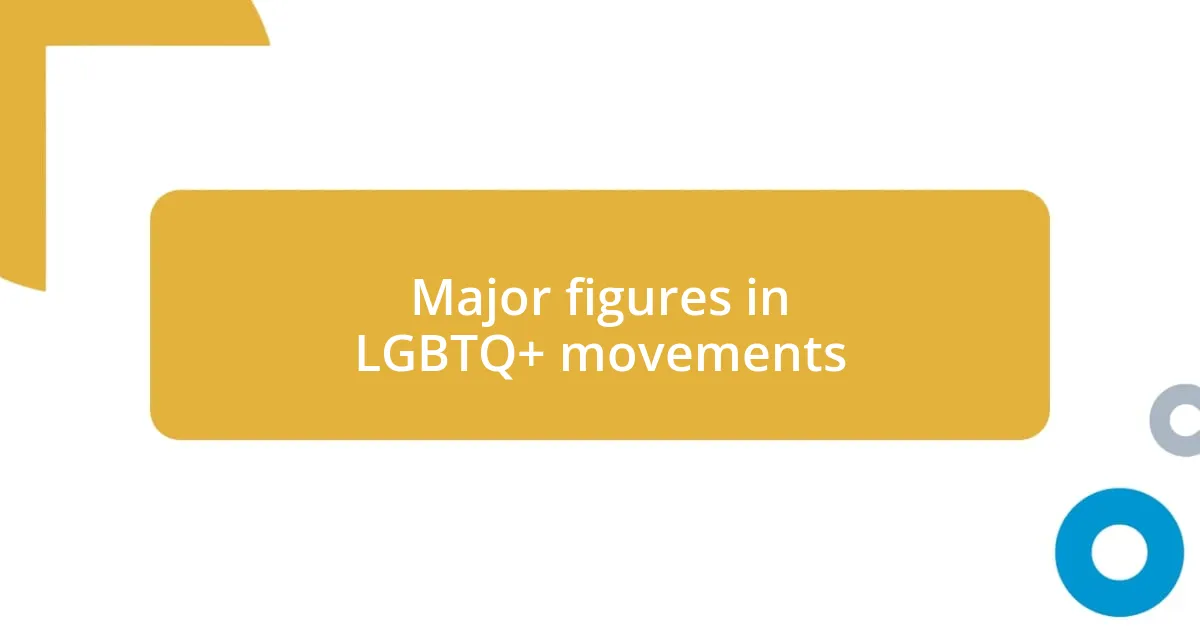
Major figures in LGBTQ+ movements
The LGBTQ+ movement has been shaped by numerous iconic figures whose bravery and vision have inspired countless others. One figure that stands out to me is Marsha P. Johnson, a Black transgender activist who played a pivotal role in the Stonewall Riots. I often reflect on her fierce spirit; it’s incredible how her fight for transgender rights and her commitment to the LGBTQ+ community ignited conversations about intersectionality long before it became a popular term.
In my own journey, I’ve learned about Harvey Milk, the first openly gay elected official in California. I remember feeling moved by his message of hope and acceptance, especially when he famously said, “You gotta give ’em hope.” His vision resonates deeply with me; it’s a reminder that one person’s voice can echo through history, inspiring others to live authentically and advocate for their rights. Isn’t it inspiring to think about how his legacy continues to impact new generations?
Lastly, I can’t help but admire Audre Lorde, whose work as a poet and activist has profoundly influenced the LGBTQ+ movement. Her perspective on identity and the intersection of race, gender, and sexuality has opened my eyes to the complexities of advocacy. When I read her words, I feel a sense of urgency to support those whose voices remain marginalized. What would our conversations look like if we embraced the narratives of all members of the community? Lorde’s insights compel me to consider how we can uplift every story, ensuring that no one is left behind in our fight for justice and equality.
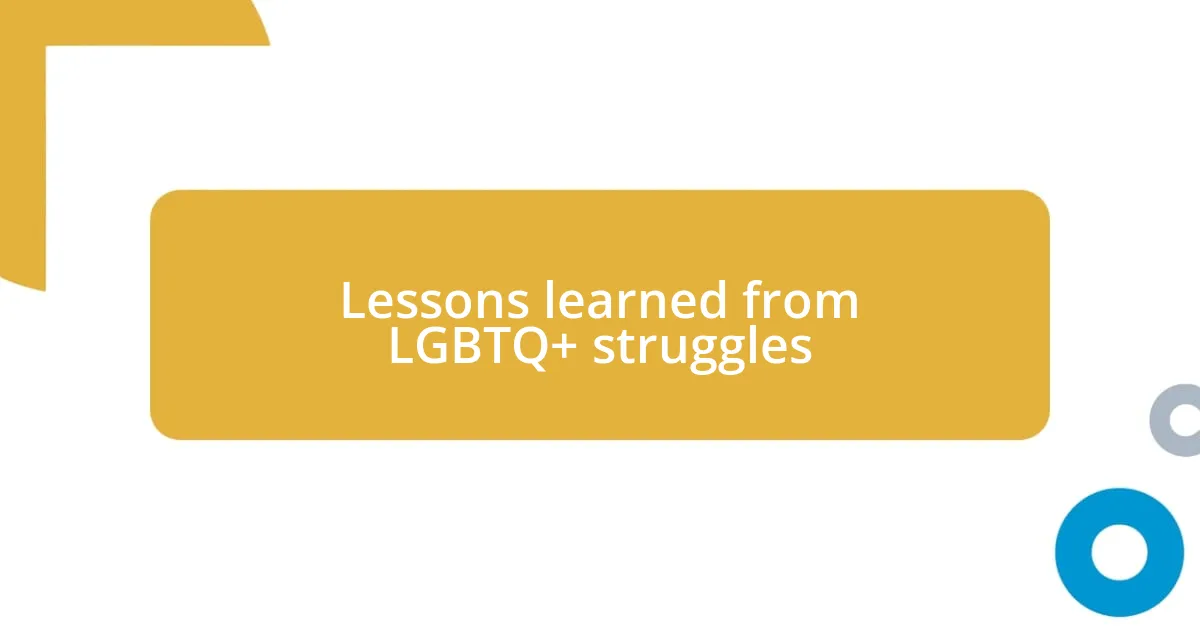
Lessons learned from LGBTQ+ struggles
The struggles faced by the LGBTQ+ community have taught us invaluable lessons about resilience and the importance of unity. I recall a time when I volunteered at a local LGBTQ+ center, where I met people from all walks of life, each with their own stories of hardship and triumph. Listening to them reinforced my belief that struggles often forge unbreakable bonds, reminding us that solidarity is a powerful tool for change.
One of the most poignant lessons I’ve learned is the significance of visibility. During a documentary screening, witnessing individuals share their experiences delicately woven into the fabric of their identities struck a chord with me. It became clear that representation matters; when LGBTQ+ voices are amplified, society can better understand the diversity and richness of our community. Their courage to be seen fosters acceptance and compassion, and it sparks critical conversations.
Moreover, LGBTQ+ struggles illustrate that love and acceptance can be revolutionary acts. I vividly remember a moment watching a couple share their journey of overcoming societal challenges at a community forum. Their unwavering commitment to each other, despite the odds, illustrated that love isn’t just a feeling; it’s a powerful movement. It begs the question: how can we all be agents of love and acceptance in our daily lives? This reflection leaves me hopeful that small acts of kindness and understanding can ripple out and create profound change.
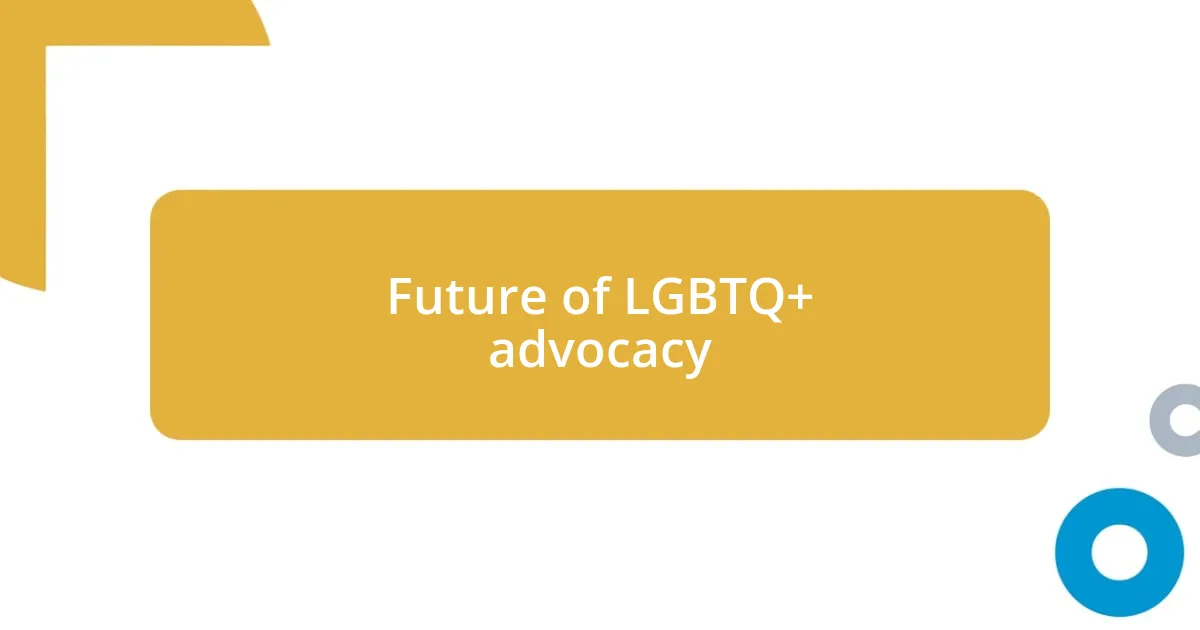
Future of LGBTQ+ advocacy
The future of LGBTQ+ advocacy is an exciting yet complex landscape, marked by both hope and the need for continual progress. I remember attending a pride event where a young activist spoke passionately about redefining intersectionality in advocacy. It struck me how vital it is to embrace not only our differences but also the unique challenges each subgroup faces within the community. Can we truly advocate for all voices if we don’t understand their specific struggles?
As we look ahead, I see technology playing a crucial role in amplifying our reach. It’s fascinating how social media creates a platform for younger generations to express themselves, connect, and mobilize around causes. I often engage with online discussions about LGBTQ+ rights, and it’s inspiring to watch younger activists challenge the status quo. This digital age invites the question: how can we utilize these new tools to ensure that our movement remains inclusive and dynamic, understanding the voices that may still be unheard?
Lastly, I can’t help but think about the importance of mental health support within advocacy. My experience volunteering for a mental health organization taught me that emotional well-being is often foundational for activism. It made me realize: how can we expect individuals to fight for their rights if they feel overwhelmed or unsupported? Fostering a culture of care will be crucial for sustaining the energy and passion needed to keep the movement alive. It’s a continuous journey, and together, I believe we’ll navigate these challenges toward a more inclusive future.
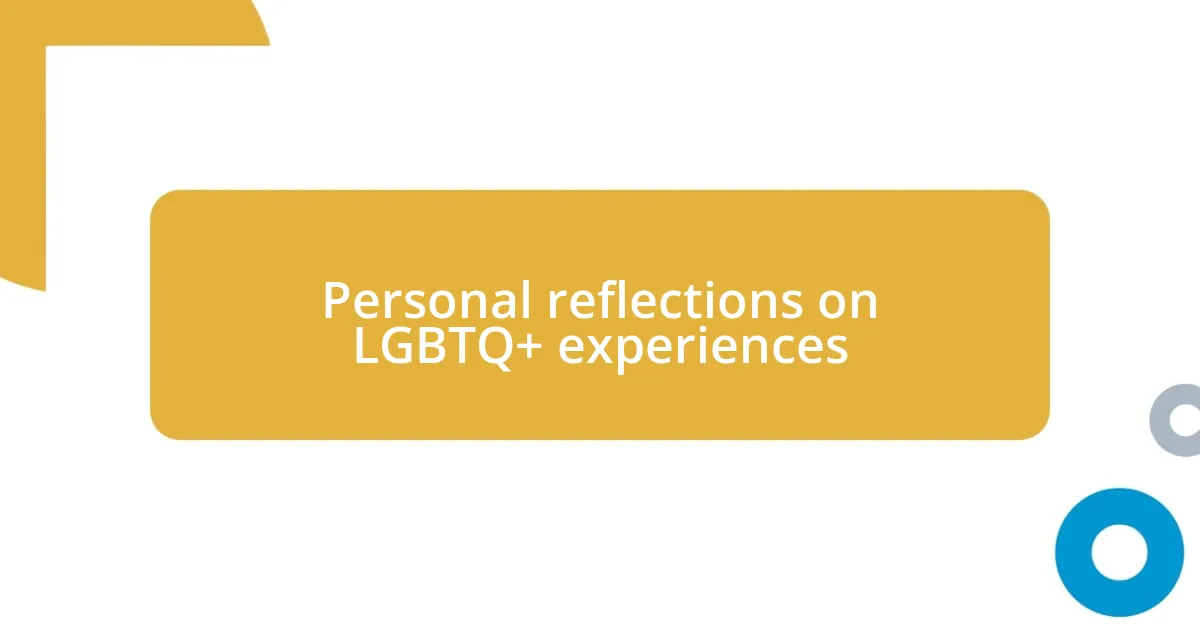
Personal reflections on LGBTQ+ experiences
Reflecting on my own LGBTQ+ experiences, I often think about the moments that profoundly shaped my identity. I remember sitting in a café one day, overhearing a conversation between two friends discussing their coming-out journeys. Their laughter mixed with vulnerability made me realize how powerful it is to share our stories. It struck me then that openness can be a bridge, connecting diverse experiences and fostering understanding.
I find myself repeatedly drawn to the idea of community, especially during pride celebrations. There’s a magnetic energy in the air, where strangers become family, united in a shared struggle for acceptance and love. I once held hands with a fellow attendee as we marched together, feeling the weight of our histories lift with each step. That moment made me ponder: what does it mean to stand together against adversity? It’s in those experiences that I feel the true spirit of resilience, which teaches us that every individual’s story is a thread in our collective tapestry.
Sometimes, I reflect on the costs of silence—both personally and within the broader community. I recall hesitating to share my own truth at a discussion group, feeling a wave of fear wash over me. The fear of rejection or misunderstanding can be paralyzing. But when I finally spoke up, I was met with acceptance and encouragement, which reinforced my belief that voicing our experiences is not only personal liberation but a call to others who may be feeling the same way. Isn’t it incredible how sharing our truths can spark feelings of solidarity? These personal reflections highlight not only our individual journeys but the broader tapestry that is LGBTQ+ history, each story vital and impactful in its own right.
